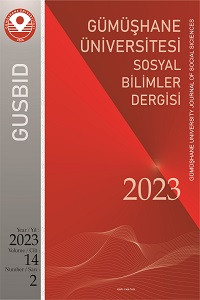Panislamizm Değil Neoklasik Realizm: İktidarının İlk Yıllarında II. Abdülhamid’in Britanya Politikası
Öz
Bu çalışmada Türk tarihinin en tartışmalı dönemlerinden biri olan II. Abdülhamid dönemi ele alınmıştır. Ancak dönemin tamamı çalışmanın konusu değildir. Çalışma, süre olarak II. Abdülhamid iktidarının ilk yılları ve alan olarak Britanya politikası ile sınırlandırılmıştır. Söz konusu dönem birçok kaynakta İslam birliği politikası ile açıklanmaya çalışılmışsa da bu çalışmanın tezi, söz konusu dönemin dış politikası için açıklayıcı kavramın Panislamizm değil neoklasik realizm olduğudur. Bir sistem teorisi değil, bir dış politika teorisi olması dönemin dış politikasını anlamak için neoklasik realizmi oldukça uygun bir teori haline getirmiştir. Dönemin büyük güçlerinden biri olan Britanya ile geçmişteki ihtişamını kaybetmiş ve artık bölgesel bir güç konumunda olan Osmanlı Devleti arasındaki dört temel temas noktası -Balkanlar, Kıbrıs, Ermeni meselesi, Mısır- üzerinden değerlendirilerek, uygulanan dış politikanın sistemik etkilerin, başta lider imajı olmak üzere ara değişkenlerle dönüştürülmesi sonucu ortaya konulduğu sonucuna varılmıştır.
Anahtar Kelimeler
II. Abdülhamid Neoklasik realizm Panislamizm Osmanlı Britanya
Destekleyen Kurum
-
Proje Numarası
-
Teşekkür
-
Kaynakça
- Akçura, Y. (2005). Üç tarz-ı siyaset. Ankara: Lotus Yayınevi.
- Akşemsettinoğlu, G. (2002). Power politics in international affairs. Foreign Policy, 29 (3-4), 66-76.
- Arı, T. (2004). Uluslararası ilişkiler teorileri. İstanbul: Alfa Yayınları.
- Arıboğan, D. Ü. (2007). Uluslararası ilişkiler düşüncesi. İstanbul: Bahçeşehir Üniversitesi Yayınları
- Armaoğlu, F. (1997). 19. Yüzyıl Siyasi Tarihi (1789-1914), Ankara: Türk Tarih Kurumu Yayınları.
- Aydın, M. (2004). Uluslararası ilişkilerin “gerçekçi” teorisi: kökeni, kapsamı, kritiği. Uluslararası İlişkiler, (1)1, 33-60.
- Aydın, M. (2005). İstanbul Konferansı (1876)’na giden yolda Britanya’nin Doğu politikası. Pamukkale Üniversitesi
- Eğitim Fakültesi Dergisi, 17(17), 59-66. Erişim adresi: https://dergipark.org.tr/tr/pub/pauefd/issue/11126/133060
- ________(2006). Osmanlı-İngiliz İlişkilerinde İstanbul Konferansı (1876)’nın Yeri, Tarih Araştırmaları Dergisi, 25(39), 101 – 115.
- Balci, A., Kardaş, T., Ediz, İ., & Turan, Y. (2020). War Decision and Neoclassical Realism: The Entry of the Ottoman Empire into the First World War. War in History, 27(4), 643–669. https://doi.org/10.1177/0968344518789707
- Barlak, H. (2016). Esad Efendi’nin “İttihad-I İslam” risalesinde İslam birliği ve Osmanlı Halifesine bağlılık düşüncesi. Uluslararası Sosyal Araştırmalar Dergisi, 9(43), 598-615
Öz
This study focuses on the period of Abdülhamid II, one of the most controversial periods of Turkish history. However, the entire period is not the subject of the study. The study is limited to the first years of Abdülhamid II's rule in terms of duration and the Britain policy in terms of field. Although many sources have tried to explain the period in question with the policy of Islamic unity, the thesis of this study is that the explanatory concept for the foreign policy of the period in question is neoclassical realism, not Panislamism. The fact that it is not a system theory but a foreign policy theory makes neoclassical realism a very appropriate theory for understanding the foreign policy of the period. By evaluating the four main points of contact between Britain, one of the great powers of the period, and the Ottoman Empire, which had lost its past glory and was now a regional power -Balkans, Cyprus, Armenian issue, Egypt-, it was concluded that the foreign policy implemented was the result of the transformation of systemic effects with intermediate variables, especially the image of the leader.
Anahtar Kelimeler
Abdulhamid II Neoclassical realism Panislamism Ottoman Britain
Proje Numarası
-
Kaynakça
- Akçura, Y. (2005). Üç tarz-ı siyaset. Ankara: Lotus Yayınevi.
- Akşemsettinoğlu, G. (2002). Power politics in international affairs. Foreign Policy, 29 (3-4), 66-76.
- Arı, T. (2004). Uluslararası ilişkiler teorileri. İstanbul: Alfa Yayınları.
- Arıboğan, D. Ü. (2007). Uluslararası ilişkiler düşüncesi. İstanbul: Bahçeşehir Üniversitesi Yayınları
- Armaoğlu, F. (1997). 19. Yüzyıl Siyasi Tarihi (1789-1914), Ankara: Türk Tarih Kurumu Yayınları.
- Aydın, M. (2004). Uluslararası ilişkilerin “gerçekçi” teorisi: kökeni, kapsamı, kritiği. Uluslararası İlişkiler, (1)1, 33-60.
- Aydın, M. (2005). İstanbul Konferansı (1876)’na giden yolda Britanya’nin Doğu politikası. Pamukkale Üniversitesi
- Eğitim Fakültesi Dergisi, 17(17), 59-66. Erişim adresi: https://dergipark.org.tr/tr/pub/pauefd/issue/11126/133060
- ________(2006). Osmanlı-İngiliz İlişkilerinde İstanbul Konferansı (1876)’nın Yeri, Tarih Araştırmaları Dergisi, 25(39), 101 – 115.
- Balci, A., Kardaş, T., Ediz, İ., & Turan, Y. (2020). War Decision and Neoclassical Realism: The Entry of the Ottoman Empire into the First World War. War in History, 27(4), 643–669. https://doi.org/10.1177/0968344518789707
- Barlak, H. (2016). Esad Efendi’nin “İttihad-I İslam” risalesinde İslam birliği ve Osmanlı Halifesine bağlılık düşüncesi. Uluslararası Sosyal Araştırmalar Dergisi, 9(43), 598-615
Ayrıntılar
| Birincil Dil | Türkçe |
|---|---|
| Bölüm | Makaleler |
| Yazarlar | |
| Proje Numarası | - |
| Yayımlanma Tarihi | 12 Haziran 2023 |
| Gönderilme Tarihi | 17 Şubat 2023 |
| Yayımlandığı Sayı | Yıl 2023 Cilt: 14 Sayı: 2 |



